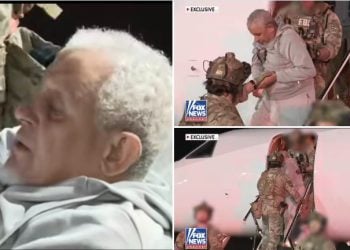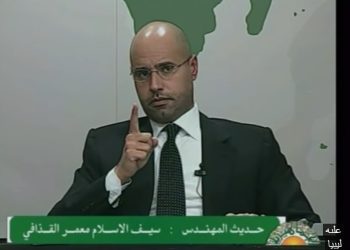By Ashraf Abdul-Wahab and Hadi Fornaji.
Tripoli, 29 July 2014:
Tripoli was like a ghost town for much of today. Even taking into . . .[restrict]account that it was the second day of Eid, normally a quiet time, the city was unnaturally empty. All the way from Janzur eastwards this morning, along Gurji Road to Omar Mukhtar Street, as well as in Shara Al-Shat and in Ben Ashur, there were very few cars on the streets and the supermarkets and small food shops that are normally open on the second day of Eid were closed. So too were most of the cafés which usually do a roaring business during the second and third days of Eid.
And from Janzour to Sidi Mesri not a single police vehicle or policeman at a checkpoint could be seen.
What was noticeable today instead of the cars was the rubbish. There are mountains of it, pilling up because the street cleaners have stopped work, frightened to go out. Some piles were being set on fire today by residents in an effort to get rid of them – the stench in the air has adding to that of the burning fuel tanks on the Airport Road.
As in Benghazi, residents have been taking advantage of Eid to leave the capital. Border control sources say that 8,000 Libyans left the country through the Ras Jedir Tunisian border crossing yesterday.
In the western suburb of Janzour today, the situation was likewise relatively calm after yesterday’s missile attacks in which one person was killed. He has been named as 59-year-old Mohamed Sbeida.
Several homes were hit, mainly in two parts of the suburb – eastern Janzour and in Sidi Abduljalil, although reports that Janzour Police station had been hit are not true.
The barrage which started about 10 am only finally stopped when it got dark. The Zintani Qaaqaa Brigade is being blamed. It is said to be trying to target the Fursan Janzour (Knights of Janzour) Brigade – part of the alliance that includes the Libyan Revolutionaries Operations Room, Suq Al-Juma brigades and Misrata forces attempting to force the Zintanis out of the capital.
The relative calm – some explosions could be heard in the capital today – was largely due to the ceasefire organised by Tripoli Municipal Council to enable firefighters to put out the massive blaze at the Airport Road fuel depot. However, hopes of that were dashed later when clashes re-erupted on the road and another tank was hit.
Hopes of a more general ceasefire lasting, despite appeals from the government, also appear increasingly slim. Groups and areas have been lining up to declare their support for one side or another.
At a meeting yesterday in Zahra, west of Tripoli, Warshefana leaders agreed to send forces into the city to support the Zintanis against the Misratan-led alliance. The Tebus, too, have announced their support for the Zintanis and say they are sending a battalion to the capital. Gharian, on the other hand, has come out in favour of the alliance.
The Tebu move highlights a decisive shift in the Libyan political picture. Despite having been bitter rivals with the Zwai tribe for the past three years, both are now on the same side, as are the Tuaregs, supporting the linked Zintani-led coalition in Tripoli and the Operation Dignity in Benghazi.
Meanwhile, the government has effectively moved to Beida. The Prime Minister, Albdullah Al-Thinni, managed to fly last night to Labrak and then drove to the town, which during the period of the Kingdom served as the country’s summer capital and now hosts the Constitutional Assembly.
Five days ago, he was prevented from flying to Tobruk from Mitiga by allies of the alliance who control the airbase. Yesterday, after attending Eid prayers at the Moulay Mohamed Mosque in downtown Tripoli, he flew out from the otherwise inactive Tripoli International Airport on a government jet.
Beida is seen as one the safest places in the country at present, and completely neutral in the polarising situation [/restrict]






